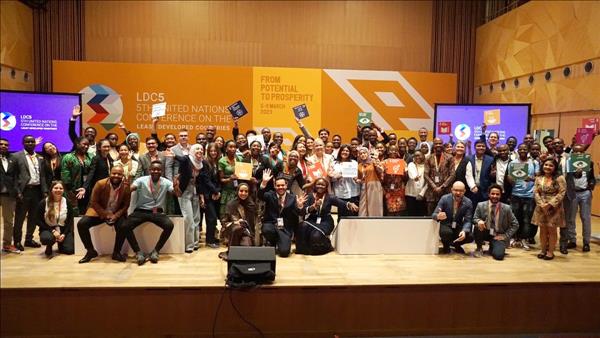(MENAFN- The Peninsula) The Peninsula
the peninsula - DOHA
Qatar Foundation's Doha Debates has collaborated with the United Nations Office of the High Representative for the Least Developed Countries, Landlocked Developing Countries and Small Island Developing States (UN-OHRLLS) on a leadership training program for youth delegates.
The programme culminated with the young changemakers attending the Fifth United Nations Conference on the Least Developed Countries (LDC5) in Doha, which ended on March 9.
Through the eight-week online program, 92 young leaders from across the globe worked with international experts to develop critical leadership, facilitation, communication, and advocacy skills. They learned to use constructive dialogue and debate to problem-solve and take action to realize the Sustainable Development Goals (SDGs). During the LDC5 Conference, the delegates presented a Youth Declaration: a nine-point document developed in consultation with young people living in the 46 Least Developed Countries (LDCs).
Titled“For All Generations,” the Youth Declaration calls for empowerment and inclusion of youth in the implementation of LDC action plans and emphasises the urgent need to address issues that will impact their future - including climate change, gender inequality, economic and educational opportunities, safety and security, improved pandemic response, and access to technology.
The aim of the LDC5 Conference is to accelerate sustainable development in places where international assistance is needed the most. Over five days in Doha, world leaders gathered with the private sector, civil society, parliamentarians, and LDC Youth Delegates to advance new ideas, raise new pledges of support and spur delivery on agreed commitments through the Doha Programme of Action (DPoA). If implemented in full, the DPoA will help the world's least-developed countries address the ongoing COVID-19 pandemic, return to a pathway to achieve the SDGs, address climate change, and make strides towards sustainable, irreversible graduation out of the LDC category.
Rabab Fatima, High Representative for UN-OHRLLS, said:“LDC5 represents a once-in-a-decade opportunity to chart a new path for accelerating sustainable development in the world's LDCs. But the meaningful involvement of young people is essential to achieving this. This is why we are empowering youth from the Least Developed Countries to amplify their voices: so that they are not just heard, but acted upon.”
Through educational programing and media content-including live debates, podcasts, films, and digital campaigns-Doha Debates empowers a new generation of leaders to bridge divides, find common ground, and work together to address the world's biggest challenges. The organization's programs and content are modeled after Majlis-style debates, which create a welcoming, solutions-oriented space for participants with diverse viewpoints to discuss timely issues and events.
“Doha Debates is honoured to collaborate with the UN-OHRLLS on this program for young changemakers,” said Amjad Atallah, Managing Director of Doha Debates.“As 2030 grows ever closer, we must deliver on global commitments to help LDCs achieve the Sustainable Development Goals. These youth delegates have a critical role to play in holding world leaders and institutions accountable, and our aim was to help them navigate the LDC5 Conference with authority and assurance, engaging in critical conversations to ultimately bring about lasting change.”
The LDC5 Youth Delegates will now also become Doha Debates Ambassadors, a highly selective international community of young leaders with diverse backgrounds, all committed to the exploration and growth necessary to have challenging conversations about complex global issues, seek common ground, and build consensus for positive social change.
In addition to preparing youth delegates for the LDC5 Conference, Doha Debates curated a series of conversations in the Doha Portal, a mobile space that uses technology to connect individuals around the world and engage them in constructive dialogue around global issues. Conference attendees in Doha were able to speak directly to young people living in Rwanda, Ethiopia, and Uganda-the very countries that are the focus of the conference.
Portal participants also discussed how young leaders can address critical challenges that LDCs currently face, including barriers to entrepreneurial innovation, climate change, gender equality, and the digital divide.




















Comments
No comment